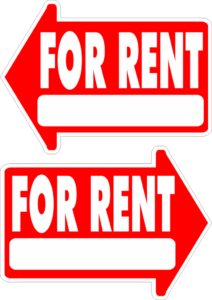Short-Term Rental vs Airbnb
There are many circumstances where a short-term rental or Airbnb-type short stay makes perfect sense. A long vacation where you plan to stay more than a week in one place. When you are making a move and your new place won’t be ready for move in when you are. When you move to a new state and you aren’t sure exactly where you want to settle. While you are waiting for closing on a new house but had to be out of the old one. Or while looking for a permanent home where you don’t want to be rushed into taking the first available place. Any of these scenarios can leave you with a gap of time where you need temporary housing.

Airbnb and Such
An Airbnb or comparable service can assist you in finding a short-term rental which is usually considered to be less than 28 days. 28 days or longer is considered a long-term rental or extended stay. Rentals are their specialty and you can find everything from camper hook-ups to a room in someone’s house to an entire home to yourself. Rates vary widely. They are based on what the owner wants for their trouble plus service charges for booking through that company, and any other applicable fees and taxes. Be aware that short-term rentals have been banned or restricted in some areas so do your homework when considering an area to rent in.
One advantage of Airbnb is that most rentals are furnished with at least the basics. You can usually find multiple offerings in the area you are searching for, especially in more urban areas. Some offer amenities such as access to a pool or exercise equipment but these are usually pricier. If you are trying out different neighborhoods in the same city, this may be the easiest option. In addition to the requirements through the rental agency, hosts may have additional requirements you will need to meet such as stripping linens and starting laundry before you leave. The amount due is usually paid upfront but for long-term rentals, you may be able to pay a month at a time. You can get discounts and save on some of the fees when you book long-term.

Short-Term Rentals
The biggest drawback to finding a short-term rental is the lack of availability. Most owners want the commitment of a longer-term lease because they can budget on expected income. When the property isn’t rented, they have no income from it and may have considerable expenses for advertising and maintenance. However, some are not opposed to renting for a short term, usually by the month, so it doesn’t hurt to ask. You may still need the first and last month’s rent and a security deposit. If you are thinking months rather than weeks, this may be the most cost-efficient option. Without a 6-month to 1-year lease, you may also experience increases in the cost of your rental during your stay.
Rental properties are usually unfurnished so you will need to bring along what you need. This may be as simple as a blow-up mattress and sheets with some camp chairs or more involved if you are making a big move. You can eat out or bring along cooking supplies. You will be expected to clean up after yourself, but this is standard no matter how you rent.
For owners, short-term rentals are more profitable than long-term rentals. If they stay booked, they can earn more in fees which they lose in discounting a long-term booking. However, they also increase the risk of vacancies with no income. Owners also set the maximum length of stay for the rental, which may also be subject to local or state laws.

Are There Other Options?
If you have relatives in the area, they may be willing to rent you a room or guest house for a short period or let you camp out on the couch for free (for a while) if you pitch in with the chores. Or you may be able to park your camper in their driveway.
Most hotels have a weekly rate which will give you a discount over the nightly rate. Like most property owners, they only make money when rooms are rented. This may be an easy option but if the amount of time stretches out, your budget will suffer.
If you have a property you want to rent out short-term, you can consider listing it with either an Airbnb-type manager or a Rental Agency. Both will expect a percentage of the rent as payment for their services. Both will save you from having to handle the rentals or bookings yourself. However, Airbnb hosts are expected to have a more hands-on approach than that of a rental company in terms of cleaning and maintenance. A rental company, such as The Property Manager in Durango, will handle more of the maintenance and upkeep for you.
If you are looking for a rental property in Durango Colorado, short or long-term, consider The Property Manager. They will help you find a place to fit your needs.
Resources
https://trvlguides.com/articles/airbnb-short-term-long-term-rentals
https://www.trulia.com/guides/short-term-rentals/
https://www.airbnb.com/stays/monthly



